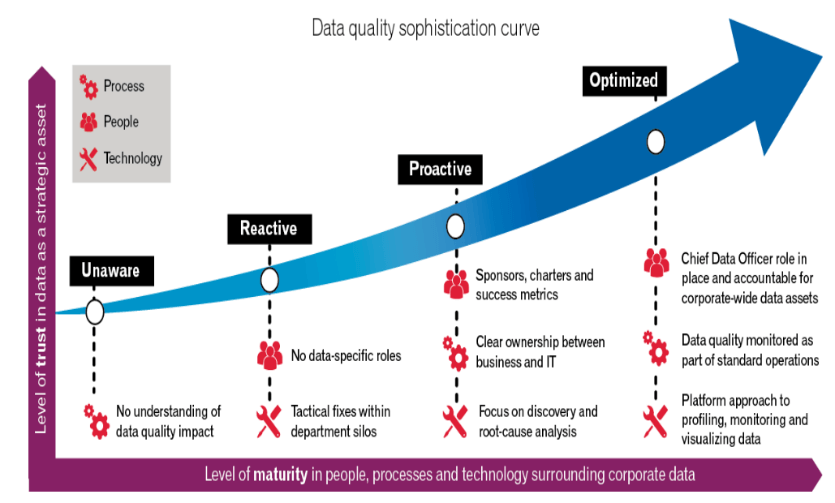- Products

Enjoy a free 30-day trial of our
data validation software.Experience the power of trusted data
solutions today, no credit card required! - Solutions

Enjoy a free 30-day trial of our
data validation software.Experience the power of trusted data
solutions today, no credit card required! - Partners

Enjoy a free 30-day trial of our
data validation software.Experience the power of trusted data
solutions today, no credit card required! - Learn more
- Pricing
- Contact Us
3 questions to ask when hiring a Chief Data Officer (CDO)

The role of a chief data officer may take on a variety of shapes depending on the industry, enterprise, and maturity of the data program he or she is working for.
Our research reports mature data organizations are more likely to have a chief data officer in place.
The question is: At what point in your data management program should you hire a CDO? And, how does the CDO’s role evolve as your data program evolves?
To understand when you hire a CDO and the scope of their role, you need to understand where you land within the data maturity scale, and where you want to go.

Most organizations who are thinking about hiring a CDO have a proactive mindset but are probably still reactive to data initiatives that arise from the IT department or analyst needs.
At what point in your data management program should you hire a CDO? The perfect time is when you are ready to be proactive about your data management initiatives. In other words, you recognize the value of accurate data to inform business decisions and a data-driven culture.
For example, this would mean every marketing campaign is supported by enriched customer data, so your marketers are confident they are targeting the right people with messaging that will easily resonate with your customers.
What does the CDO role entail when you are moving from a reactive data management plan to proactive? A CDO hired into a reactive data management strategy will essentially be building a data management program from the ground-up so their team can be proactive when fixing data issues. The scope of the CDO’s role will look like this:
- Problem solving and resourcefulness will be necessary since the CDO will not yet have a team of data professionals and their IT team will most likely be bogged down with other tasks.
- Gaining an understanding of the current state of data usage across the business and how leaders would like to promote using data to inform business decisions.
- Discovering the root-cause of data issues and inaccuracies, then finding a solution that monitors and validates data.
- Researching and implementing data quality management tools that are user friendly and will easily be adopted by the organization.
- Piloting data management programs that begin to motivate business users to think about what data they use on a daily basis and how the data can be optimized to help make their jobs easier.
The role of a CDO in a data evolution needs to be fast-paced and action-oriented since the best way to see ROI on data initiatives is when business users have access to data.
Our research reports data mature organizations are more likely to have a CDO and see data enablement as a focus to a great extent, which empowers users to access and leverage accurate insights.
As a data program evolves and the organization adopts data-insightfulness as a core value, the role of the CDO will evolve too. As a program makes it to the optimal maturity stage, the CDO’s goal won’t need to be so tactical, it will be to align data initiatives to key business objectives to see greater return on investment.
How does a CDO’s role evolve as the business moves through the data maturity scale from proactive to optimal data management strategy? A CDO’s role is much different when working within a reactive mindset versus an established, proactive data management program. The scope of the CDO’s role will look like this:
- Delegating data projects to their team of data professionals. A mature data organization usually hires data analysts (50%) and data engineers (47%).
- Monitoring a constant inflow of data and validating it as it enters the database.
- Promoting business users use of the data quality management tool that has been adopted by the business.
- Equipping business users with data literacy skills training to empower them to leverage powerful data insights.
- Aligning data initiatives to key business objects.
When a CDO is moving an organization from a proactive data strategy to optimal data strategy, their tasks are more strategic than tactical. At this point, the CDO is maintaining enterprise-wide data validity and accessibility for all users to leverage to inform business decisions.
Chief data officers are the cornerstone of success when moving through the data maturity scale. They give your enterprise the opportunity to transform your operation and make precise decisions supported by accurate insights.


